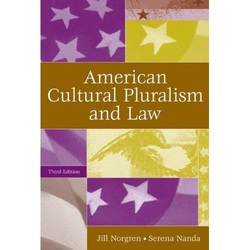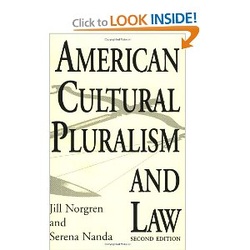American Cultural Pluralism and Law (3rd Edition)

The third edition of legal historian Jill Norgren and anthropologist Serena Nanda's book again updates our examination of the intersection of American cultural pluralism and law. We document and analyze legal challenges to the existing social order raised by many cultural groups, among them, Native Americans and Native Hawaiians, homeless persons, immigrants, disabled persons, and Rastafarians. In addition, we examine such current controversies as the culture wars in American schools and the impact of post-9/11 security measures on Arab and Muslim individuals and communities. The book also discusses more traditional challenges to the American legal system by women, homosexuals, African Americans, Latinos, Japanese Americans, and the Mormons and the Amish.
The new chapters and updated analyses in this Third Edition reflect recent, relevant court cases dealing with culture, race, gender, religion, and personal status. Drawing on court materials, state and federal legislation, and legal ethnographies, the text analyzes the ongoing tension between, on the one hand, the need of different groups for cultural autonomy and equal rights, and on the other, the necessity of national unity and security. The text integrates our commentary with case descriptions set in historical, cultural, political, and economic context. While our thesis is that law is an instrument of social policy that has generally furthered an assimilationist agenda in American society, we also point out how in different periods, under different circumstances, and with regard to different groups, law has also some opportunity for cultural autonomy.
The new chapters and updated analyses in this Third Edition reflect recent, relevant court cases dealing with culture, race, gender, religion, and personal status. Drawing on court materials, state and federal legislation, and legal ethnographies, the text analyzes the ongoing tension between, on the one hand, the need of different groups for cultural autonomy and equal rights, and on the other, the necessity of national unity and security. The text integrates our commentary with case descriptions set in historical, cultural, political, and economic context. While our thesis is that law is an instrument of social policy that has generally furthered an assimilationist agenda in American society, we also point out how in different periods, under different circumstances, and with regard to different groups, law has also some opportunity for cultural autonomy.
American Cultural Pluralism and Law (2nd Edition)

The second edition of our classic text brings new and updated examination of American cultural pluralism and the law through the Clinton administration. While maintaining our emphasis on the concept of cultural diversity as it relates to the law in the United States, revised and new chapters reflect recent relevant court cases bearing on culture, race, gender, and class, with particular attention paid to local and state court opinions. Drawing on court materials, statutes and codes, and legal ethnographies, the text analyzes the ongoing negotiations and accommodations via the mechanism of law between culturally different groups and the larger society. An important text for courses in American government, society and the law, cultural studies, and civil rights.